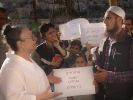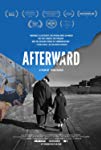Eye For Film >> Movies >> Afterward (2018) Film Review
Afterward
Reviewed by: Jennie Kermode

Was the Holocaust a singular atrocity with no true parallel in the history of humanity? is it wrong to talk about the Israeli state persecuting Palestinians in the same terms that we might talk about how the German state once persecuted Jews? These are highly fraught questions - but is that the case for reasons that are purely moral or political, or is there something deeper going on? In this bold and highly personal documentary, trauma expert Ofra Bloch travels to Israel, Germany and Palestine in search of answers.
Bloch's theory is simple yet somehow startling: that the way that Jewish people generally feel about these issues is rooted in a form of inherited trauma. As the film opens, she discusses her own experience of growing up in a community full of Holocaust survivors, surrounded by an expectation of threat that would not go away. The idea that something awful happened once so it's likely to happen again at any moment is a common feature of post traumatic stress, and makes it easier to understand why Israelis, with their vastly superior weaponry and resources, might feel existentially imperilled by Palestinian hostility. It's also, she feels, a way of looking at the situation that might make it easier to develop empathy between these groups and therefore pave the way to the sort of discussion that could actually make progress - or at least de-escalate the situation.

It takes a certain personal courage for Bloch to do what she does here, at times physically inserting herself between groups on the verge of conflict. She admits that her courage has its limits, and, in an interesting aside, considers how her own privilege has led her to overlook aspects of the Palestinian experience or make racist assumptions. This awareness also factors into the way she handles her discomfort when talking to a German man who used to identify as a neo-Nazi. Raised in a fiercely antisemitic household and quickly recruited by extremists as a disaffected teenager, he has since found his way out of that way of thinking (if there's one thing missing from the film, it's insight into how he achieved this), but the understanding of what he was and how that threatened her own existence is still difficult for Bloch, despite the sympathy she feels for him.
Sometimes getting too personal can weaken a film like this, calling the integrity of its arguments into question, but in this case it's a strength. By being willing to subject herself to the same analysis as others, Bloch gives the viewer more room to appreciate the ubiquity of the problem, and the opportunity to account for any bias she may have. Whilst not every viewer will agree with her ideas, they're approached in a way that is honest and accessible.
Along the way, there are other discoveries to be made, like the fact that many Palestinians are not aware of what happened during the Holocaust (and as horrified as anyone else when they find out). Bloch isn't as interested in what politicians and other leaders have to say as in the feelings and beliefs of ordinary people. Instead of looking at the politics of specific issues, she focuses on helping people to recognise one another's humanity. The film as a whole has a similar mission, inviting viewers to look past their usual politics and making room for something more fundamental.
Reviewed on: 23 Jan 2020
















